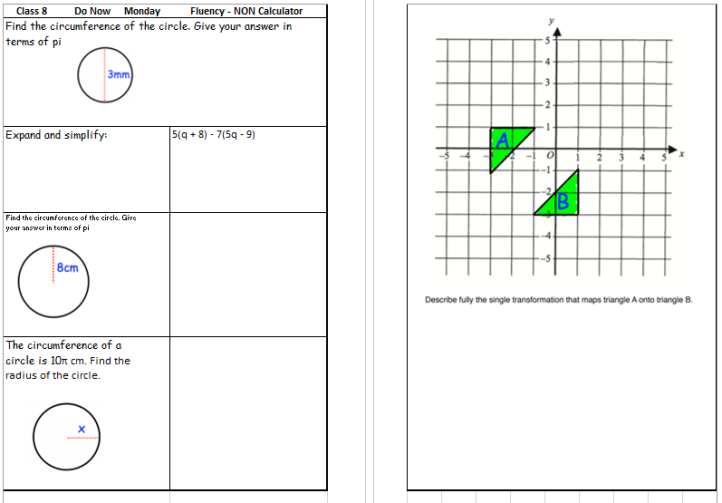For some years now I have been creating my own starter activities called “Do Nows” after the technique of the same name in @Doug_Lemov‘s ground breaking book “Teach Like a Champion 2.0”. They are modeled on @Corbettmaths‘ 5-a-day except that I choose the topic manually from a class’ most recent QLA.
The result looks as follows:
This year I have been choosing 15 sub-topics to focus on in the Do Nows which are cycled through during the week. I have explained this to the kids, why I do assessments (to get a clear picture of what they can and cannot do so I can support them better), where the topics come from that I have chosen for the Do Nows (the QLA) and especially that week 1 of each term, they will struggle on the Do Now. I know this because I have chosen topics which they could not do in the assessment at the end of the previous term. I explain that this is expected and also that I am sure they will see rapid improvement on the Do Now topics as the term progresses.
This has been so true to form that I have had kids in week 1 moaning at me that the Do Now is too hard and by week 2 they are already telling me how easy it all is!
Well this is all rosy and dandy, but having listened to nearly all of @mrbartonmaths‘ back-catalog of podcasts (I only have 13 episodes to go!) and read his incredible book “How I Wish I’d Taught Maths” (which I blogged about here), I have come across the concept of low-stakes quizzes and in particular how powerful it can be as a learning tool.
In one particular podcast, @Kris_Boulton makes the very salient point that the level of stakes involved in a test affects the levels of effort that pupils put in. This resonated with me as up until now there has been almost no stakes involved in my termly assessments and certainly no stakes at all in the Do Now except that I might “Cold Call” a pupil to give their response. I had also had the feeling that the levels of effort from my pupils was not always as high as it might be and also that the pupils were not accountable to anyone for their progress. I was making myself accountable to myself for their progress but I did not feel that they had the same accountability to me or even themselves to make progress.
Well, I have just made a small tweak to my Do Nows to bring in a low-stakes element and a degree of self-accountability for the students. The Do Now will look the same but there is an extra record sheet that the pupils will have at the front of their folders on which they will record their score each day and each week of the term. The record sheet looks like this:
This means that the pupils will visibly see their progress over time. The pupils are now accountable to themselves for making progress on the topics covered. They are also accountable to me as I can come round and look at their record sheet and if they have not made any progress by week 2 or 3 I can have a conversation with them about it. Are they copying the notes down effectively for the questions they can’t do so they can use these to help them next week? Are they using @hegartymaths to revise the topics? I have put the Hegarty Maths video numbers on the record sheet so the kids can see which videos to check out to help themselves.
There is also another benefit to the record sheet and this low-stakes record of their progress. I have some students who are doing well (some have made up to 24 months progress over 10 months this year according to our MALT standardized assessment from @HodderSchools) but they don’t necessarily feel successful. I believe that this is because I have not been clever enough about highlighting their successes. This new weekly record sheet will show the pupils that they are improving and empower them to make greater improvements. This in turn will boost their confidence and create more buy-in to what I am trying to achieve in the maths classroom which is to make everyone successful.
You can download the template here.
As always, comments and suggestions very welcome!



Fantastic- exactly where I am , this will be really useful. Thank you.
LikeLike
Pleasure! Thanks for the message, and good luck, let me know if you cone up with some good tweaks!
LikeLike
Thanks for posting, this has got me thinking a lot. I’m sure I am going to do something similar next year. Are you envisaging that they simply tick / cross the record sheet against each question? What goes in the “improvement” line? I really like the idea of the accountability / trackability of the record sheet but the trade-off for me is that you are deciding for an entire half-term what the do-now questions will be. I like having the flexibility of dropping in some questions from a topic we did a couple of weeks ago. So I’m thinking I might just to 3 weeks at a time and maybe fewer topics so some get repeated more frequently that once per week. It depends on the class, of course.
Also, what is an efficient way of creating the Do now sheets themselves? I have been cropping questions from Hegarty Maths using the preview task page but it still feels a bit slow.
LikeLike
Hi there, thanks for the message,
Yes I think they will just tick and cross
The improvement box is to say his many more they got correct that day/week.
Personally I don’t mind setting the do now topics for the half term in advance. I already do this, just without the accountability.
Yes it makes it less flexible, but I know which topics I want to focus on based on the prior half term’s qla and I want the kids to improve in those topics at the end of this term’s assessment.
In terms of creating qs, I do a mixture of simply typing qs into the excel doc, using equation editor for fractions and algebra topics and using the snip tool to cut Q’s from a variety of places including:
Mathedup ‘takeaways’ (also available on mathsgenie)
Corbettmaths
They are my main go to resources for quick questions for the do now.
I would say getting Q’s from Corbett would be quicker than from hegarty.
I hope that helps,
You have made me think about that lack of flexibility for new topics, maybe one could leave Friday’s topics blank and fill them in from the topics covered in the first week of term? That would get a few recent topics on there.
Thanks again for your comment and for making me think, I will defo continue to think about that,
Kind regards
Brendan
LikeLike
Very useful discussion. Thanks. I’ll let you know how I get on!
LikeLike
Hi – I do like the idea and I will be updating my low level testing stakes to include a progress checker, but how do you mark the work? I was going through the answers with a class when I noticed that some students were just writing down the answers when we were going through the work post test. So in one lesson I just collected the sheets in without going through the answers and found that a lot of the questions had not been answered.
LikeLike
Hi there, this is an eternal problem. I guess it is partly about the culture in the classroom, explaining why it is important to take it seriously and also issuing sanctions publicly for those who cheat, thanks for the comment and good luck with it, let me know if you have other ideas to improve it,
Kind regards,
Brendan
LikeLike
[…] mins – retrieval practice – 4 ops up to 100 and times tables + […]
LikeLike
[…] Moving from No-Stakes to Low-Stakes […]
LikeLike
[…] Low-Stakes quizzes […]
LikeLike